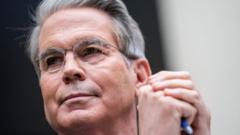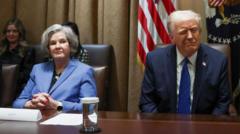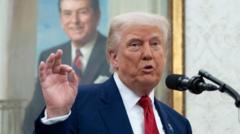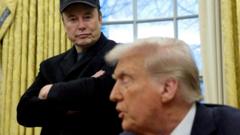In a controversial campaign against Harvard University, Donald Trump has threatened research funding and ordered federal agencies to scrutinize contracts, sparking fears of a broader conservative agenda against elite institutions. As colleges face unprecedented pressure, the implications of this battle reach far beyond the Ivy League.
Trump's Pivot: A War on Harvard and Its Implications for American Higher Education
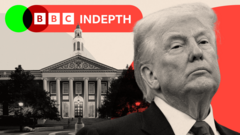
Trump's Pivot: A War on Harvard and Its Implications for American Higher Education
The former president's recent actions against Harvard signal a broader conservative push to reshape the landscape of American higher education, raising concerns about political influence on academic freedom.
In an unprecedented week for U.S. higher education, Donald Trump's administration has ramped up its attacks on Harvard University, signaling a significant shift in higher education dynamics. On Monday, Trump threatened to redirect $3 billion in research funding to vocational schools while the following day, the White House ordered a review of federal contracts with Harvard that total approximately $100 million, suggesting alternative vendors be identified. By Wednesday, Trump had escalated his rhetoric, claiming, "Harvard’s got to behave themselves," while doubling down on his belief that the university is dishonoring the country.
These actions are not isolated occurrences; they align with other measures from the administration, which include freezing over $3 billion in research grants and placing restrictions on foreign students enrolling at institutions like Harvard. Many experts perceive these moves as part of a larger, coordinated assault on one of the nation’s premier educational establishments, with ramifications extending throughout the American academic landscape.
"Trump’s aggressive tactics are not simply a critique of Harvard; they could redefine the political engagement of universities," asserts Greg Wolfson, president of the American Association of University Professors. Concerns echoed through campus discussions during Harvard’s recent commencement, where students expressed worry that this could set unsettling precedents for all American colleges. A British graduate voiced a sentiment shared by many: "If this can happen to Harvard, it can happen anywhere."
The White House has attributed its actions to a perceived failure by Harvard to address rising antisemitism, particularly in light of anti-Israel protests that have resurged since the onset of conflict in Gaza. Tensions reached a peak during congressional hearings in December 2023 when former president Claudine Gay struggled to elaborate on whether calls for violence against Jews constituted violations of student conduct codes. In response to mounting criticisms, Gay later reaffirmed her commitment to fostering an inclusive campus environment.
As the Trump administration’s campaign proceeds, calls for universities to enforce traditional values and oppose what it labels as antisemitic propaganda have intensified. The administration's demands extend well beyond addressing bias; they propose significant restructuring of institutions, including the elimination of diversity programs and reforms in admissions to favor a more conservative presence on campus.
The aggressive tactics employed by Trump reflect a broader ideological war aimed at transforming the educational landscape into one that aligns with conservative values. Observers have noted that elite colleges have long been viewed through a critical lens by right-leaning constituencies, seen as bastions of liberal thought and influence.
With institutions like Princeton and the University of Pennsylvania facing similar scrutiny and funding adjustments, the message is clear: The Trump administration wishes to reshape the dialogue around higher education and its role in American society. The strategy has prompted fear among higher education advocates that the fundamental values of inclusivity and academic freedom may be threatened.
While universities have begun to engage legally with the administration's measures—Harvard, for instance, won a temporary block against visa restrictions for foreign students—this battle has ignited widespread concern regarding the long-term implications for academic independence.
Polling indicates that while Trump's base largely supports his initiatives against elite institutions, a significant part of the general populace rallies behind the mission of American universities. The impact of these shifts—should they be fully realized—remains uncertain, yet it is clear that Trump’s interventions are breaching the long-held notion of universities as insulated sanctuaries of knowledge.
The intersection of politics and education is an ongoing negotiation, with academics and students vigilantly eyeing the unfolding political landscape. The ongoing battle underscores a new era of scrutiny for institutions of higher learning and poses questions about the future of academic diversity and independence against a backdrop of increasingly polarized political forces.










